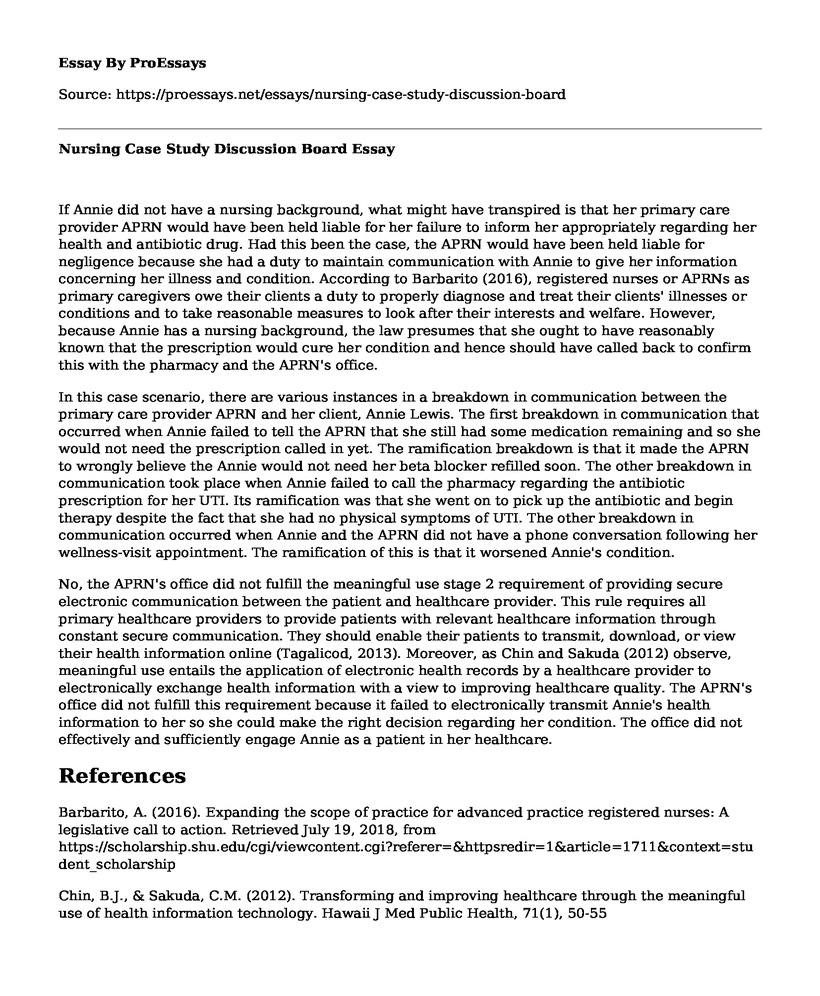If Annie did not have a nursing background, what might have transpired is that her primary care provider APRN would have been held liable for her failure to inform her appropriately regarding her health and antibiotic drug. Had this been the case, the APRN would have been held liable for negligence because she had a duty to maintain communication with Annie to give her information concerning her illness and condition. According to Barbarito (2016), registered nurses or APRNs as primary caregivers owe their clients a duty to properly diagnose and treat their clients' illnesses or conditions and to take reasonable measures to look after their interests and welfare. However, because Annie has a nursing background, the law presumes that she ought to have reasonably known that the prescription would cure her condition and hence should have called back to confirm this with the pharmacy and the APRN's office.
In this case scenario, there are various instances in a breakdown in communication between the primary care provider APRN and her client, Annie Lewis. The first breakdown in communication that occurred when Annie failed to tell the APRN that she still had some medication remaining and so she would not need the prescription called in yet. The ramification breakdown is that it made the APRN to wrongly believe the Annie would not need her beta blocker refilled soon. The other breakdown in communication took place when Annie failed to call the pharmacy regarding the antibiotic prescription for her UTI. Its ramification was that she went on to pick up the antibiotic and begin therapy despite the fact that she had no physical symptoms of UTI. The other breakdown in communication occurred when Annie and the APRN did not have a phone conversation following her wellness-visit appointment. The ramification of this is that it worsened Annie's condition.
No, the APRN's office did not fulfill the meaningful use stage 2 requirement of providing secure electronic communication between the patient and healthcare provider. This rule requires all primary healthcare providers to provide patients with relevant healthcare information through constant secure communication. They should enable their patients to transmit, download, or view their health information online (Tagalicod, 2013). Moreover, as Chin and Sakuda (2012) observe, meaningful use entails the application of electronic health records by a healthcare provider to electronically exchange health information with a view to improving healthcare quality. The APRN's office did not fulfill this requirement because it failed to electronically transmit Annie's health information to her so she could make the right decision regarding her condition. The office did not effectively and sufficiently engage Annie as a patient in her healthcare.
References
Barbarito, A. (2016). Expanding the scope of practice for advanced practice registered nurses: A legislative call to action. Retrieved July 19, 2018, from https://scholarship.shu.edu/cgi/viewcontent.cgi?referer=&httpsredir=1&article=1711&context=student_scholarship
Chin, B.J., & Sakuda, C.M. (2012). Transforming and improving healthcare through the meaningful use of health information technology. Hawaii J Med Public Health, 71(1), 50-55
Tagalicod, R. (2013). Stage 2: Engaging patients in their healthcare. Center for Medicare & Medicaid Services. Retrieved July 19, 2018, from https://www.cms.gov/eHealth/ListServ_Stage2_EngagingPatients.html
Cite this page
Nursing Case Study Discussion Board. (2022, Jun 30). Retrieved from https://proessays.net/essays/nursing-case-study-discussion-board
If you are the original author of this essay and no longer wish to have it published on the ProEssays website, please click below to request its removal:
- Capstone Evaluation on Pressure Ulcers
- Diagnosis Effects of Chemotherapy for Breast Cancer
- Hemophilia and Preventing Episodes of Bleeding in Affected Children Paper Example
- Parents Personal and Medical History Regarding the Ear Infection of a Three Years Old Boy
- Essay Sample on Obesity Among African Americans in Fort Worth, Texas
- Research Paper on Ethics in ICU Nursing: Balancing Autonomy and Vulnerability
- Essay Example on Detecting Refractive Error in Your Child: When to Take Action







